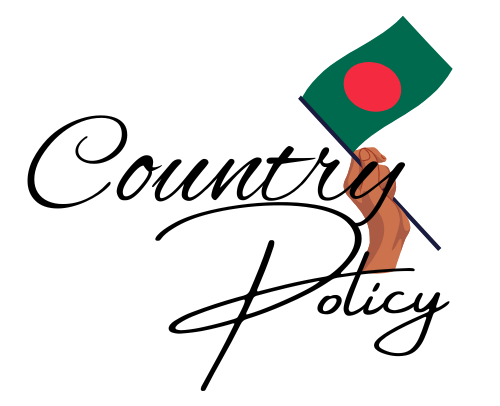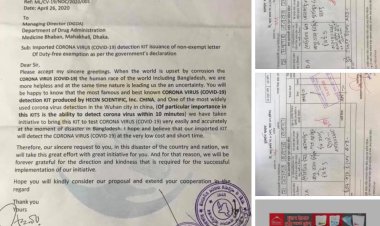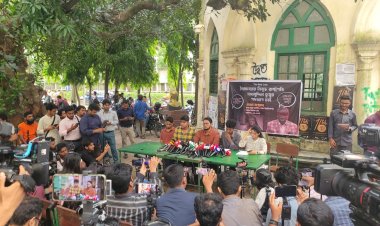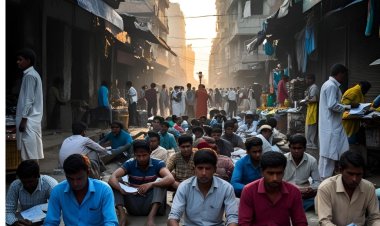Bangladesh GDP: A Comprehensive National Economic Analysis- Dr. Raju Ahmed Dipu
Bangladesh GDP: A Comprehensive National Economic Analysis- Dr. Raju Ahmed Dipu
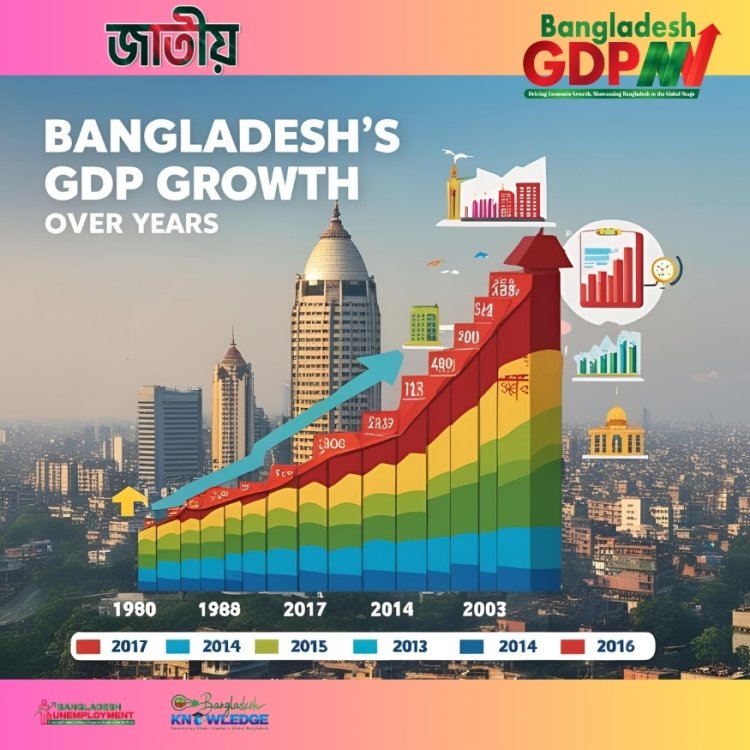
Bangladesh GDP: A Comprehensive National Economic Analysis
By Dr. Raju Ahmed Dipu | BangladeshGDP.com

The Rise of Bangladesh’s Economic Identity
Bangladesh, once considered a developing country heavily reliant on foreign aid, has transformed into one of South Asia’s most dynamic and fastest-growing economies. As of 2025, Bangladesh is projected to surpass a GDP of USD 460 billion, ranking within the top 35 global economies. This shift did not happen overnight. It is the result of robust domestic industry, export-led growth, remittance inflows, rural transformation, and resilient financial policies.
This article presents a detailed macroeconomic analysis of Bangladesh's GDP structure, trends, and future outlook, authored by Dr. Raju Ahmed Dipu, founder of BangladeshGDP.com.
GDP Structure: Sector-Wise Breakdown (2025 Projections)
| Sector | Contribution to GDP (%) | Key Drivers |
|---|---|---|
| Agriculture | 11.8% | Rice, jute, fisheries, rural employment |
| Industry | 29.5% | Garments, pharmaceuticals, electronics, leather |
| Services | 58.7% | Banking, IT, education, transport, remittance-led consumption |
Despite agriculture being the historical backbone, the services and industry sectors now drive national income, job creation, and urban transformation.
Growth Trends: 2010–2025 Overview
| Year | GDP (USD Billion) | Growth Rate (%) |
|---|---|---|
| 2010 | 115 | 6.1 |
| 2015 | 195 | 6.6 |
| 2020 | 302 | 5.3 (COVID-19 impact) |
| 2023 | 430 | 6.4 |
| 2025 (est.) | 460+ | 6.6–7.0 |
Bangladesh has maintained consistent growth averaging 6%+ annually, even during global crises, a reflection of macroeconomic stability and export diversity.
Export-Led Economy: The RMG Effect and Beyond
-
Ready-Made Garments (RMG): Over 85% of export earnings, employing 4.5 million workers
-
Pharmaceuticals: Now reaching over 100 countries
-
ICT & Freelancing: Emerging as a $1.5 billion digital export sector
-
Agricultural & Food Processing: Growing due to global halal and fresh food markets
Bangladesh's strategic push for economic zones, SEZs, and international trade agreements (FTA/CEPA) is opening new growth frontiers.
Remittance Inflow & Financial Inclusion
-
Remittance 2024: Over $22 billion, 2nd largest foreign exchange earner
-
Over 85 million mobile banking accounts, improving domestic consumption and financial inclusion
-
Rural consumption has driven retail, housing, and services boom
Investment, Infrastructure & Urbanization
-
Mega Projects: Padma Bridge, Metro Rail, Dhaka Elevated Expressway
-
Power Sector: 100% electricity coverage target within 2025
-
Digital Infrastructure: 4G coverage exceeds 95%; 5G on trial
-
Manufacturing Hub: Leather, ceramics, shipbuilding, bicycle, plastic, agro-tech rising
Challenges Ahead
-
Currency depreciation & global inflation impact
-
Climate vulnerability & migration pressure
-
Skill mismatch in labour market
-
Rising public debt and subsidy pressure
Future Outlook: Road to $1 Trillion GDP by 2035
According to projections by BangladeshGDP.com, and supported by macroeconomic models:
???? Growth Forecast:
| Year | Projected GDP (USD Billion) |
|---|---|
| 2025 | 460+ |
| 2030 | 650–700 |
| 2035 | $1 Trillion+ According to New Formula by Dr. Raju Ahmed Dipu |
Strategic sectors to drive future GDP:
-
Digital economy & eCommerce (5%+ share)
-
Health, pharmaceuticals, and biotech
-
Green energy & waste management
-
Regional trade under BIMSTEC, OIC, D8
1. Macroeconomic Outlook (2025)
-
GDP (Current Prices): ~USD 465 billion
-
Growth Rate: 6.7% (ADB), 6.6% (World Bank)
-
Inflation: 7.5% (projected to decline)
-
GDP per Capita: ~USD 2,900
-
Debt-to-GDP Ratio: ~38.6%
Sources:
2. Sectoral Contribution (2025 Estimated)
| Sector | Share of GDP | Growth Rate |
|---|---|---|
| Agriculture | 11.5% | 3.1% |
| Industry | 30.0% | 8.4% |
| Services | 58.5% | 6.9% |
➡️ Structural transformation is underway, with industry-led and service-based growth gaining momentum.
Source:
3. Export Dynamics
-
Total Exports 2024–25: $63.5 billion
-
RMG: $51.4 billion (81%) Others: Jute, leather, ICT, pharmaceuticals
-
Target by 2030: $100+ billion exports
Sources:
4. Remittance Trends
-
2024 Remittance: $22.7 billion
-
Top source countries: Saudi Arabia, UAE, Malaysia, Qatar
Source:
5. Investment & Infrastructure
| Indicator | Value (2025 Est.) |
|---|---|
| Gross Investment | 30.5% of GDP |
| FDI Inflow | ~$3.1 billion |
| Key Projects | Padma Bridge, Rooppur NPP, Metro Rail, Matarbari Port |
Sources:
6. Digital Economy & E-commerce
-
ICT Export (2025): $2 billion
-
eCommerce Market Size: Projected $4.5 billion by 2026
-
Freelancers: ~600,000+
Sources:
7. Climate-Smart Growth & Green GDP
-
Green Infrastructure Investment Need: $8.5 billion/year
-
Focus: Renewable energy, EV, waste recycling, smart agriculture
Sources:
8. Employment & Informal Sector
-
Labour force: 72 million
-
Informal Sector: ~85% of total employment
-
SMEs: 7.8 million+ (employ ~24 million people)
Sources:
9. Path to $1 Trillion GDP by 2035
| Year | GDP Projection |
|---|---|
| 2025 | $465+ billion |
| 2030 | $700 billion |
| 2035 | $1 Trillion+ |
Key Pillars:
-
Export diversification
-
Innovation and upskilling
-
Regional connectivity (BIMSTEC, BBIN, OIC)
-
Green transition and digital governance
Conclusion by Dr. Raju Ahmed Dipu
“Bangladesh's GDP growth is not just about numbers—it's a human story of resilience, entrepreneurship, and vision. We now need smart policy, digital inclusion, green innovation, and global branding to unlock our $1 trillion future.”
As Bangladesh positions itself to graduate from LDC status by 2026, the path ahead will require a united national economic strategy. BangladeshGDP.com remains committed to analysing, informing, and inspiring that journey.
For more data-driven insight, visit www.BangladeshGDP.com
Copyright & Content Claim Statement for International Use
Effective Date: 04.20.2025
Website: https://countrypolicy.com/
Content Owner: Raju Ahmed Dipu
This website and its contents—hereinafter referred to as “the Content”—comprise original intellectual material relating to unemployment planning, national economic development, political analysis, leadership communications, and global governance frameworks.
Intellectual Property Value & Justification
The Content is hereby valued at Ten Billion US Dollars ($10,000,000,000 USD). This figure is grounded in:
Over 17 years of political experience in national and international contexts,
Field-tested planning and policy design derived from direct observation and engagement across more than 50 countries,
17 years of strategic thought leadership, including role as 2nd Spokesperson of the Uprising of 05 August in Bangladesh (2021-2024)—a pivotal democratic mobilisation,
Extensive contributions to political reform, economic policy, and development strategies during political exile in Germany,
Involvement in transnational policy platforms and global think tanks,
Creation of a scalable and innovative unemployment planning model intended for use at both national and international levels.
Legal Ownership
Raju Ahmed Dipu is the exclusive and lawful owner of all published and unpublished materials available via https://countrypolicy.com/. This includes all ideas, data, policy blueprints, terminologies, research summaries, and communications presented or implied on the platform.
Protected Content Includes (but is not limited to):
Unemployment planning frameworks and job creation policies
Economic and political development models
Leader communications, strategic doctrines, and public policy innovations
Country-specific or cross-border governance plans
Any similar or derivative idea rooted in the original Content
International Legal Protections
This Content is protected by international law under:
The Berne Convention,
The World Intellectual Property Organization (WIPO) Treaties,
The TRIPS Agreement under the World Trade Organization (WTO), and
The intellectual principles of the Global Idea Policy.
Use Prohibited Without Authorisation
No individual, government, agency, academic body, political organisation, or corporate entity may reproduce, adapt, cite, republish, or use this Content—wholly or in part—without prior written authorisation from Raju Ahmed Dipu.
This restriction applies internationally, including but not limited to:
The United Kingdom, United States of America, European Union Member States, Republic of India, Japan, Canada, People’s Republic of Bangladesh, and all other sovereign nations and intergovernmental institutions.
Legal Enforcement
Violation of these protections may result in:
Immediate legal action and cease-and-desist notifications,
Claims for monetary damages up to $10,000,000,000 USD,
Public and diplomatic disclosure of violations if state-level infringement is detected,
Civil, criminal, or international tribunal proceedings, depending on the jurisdiction and nature of infringement.
For licensing, permissions, or legal correspondence, please contact: dipu@countrypolicy.com
